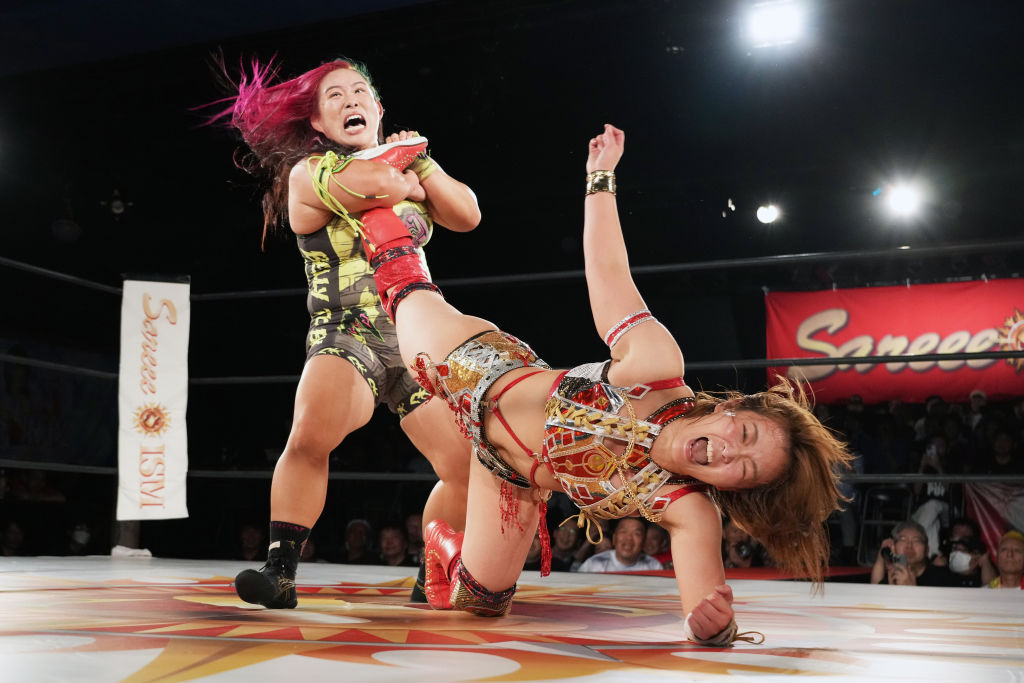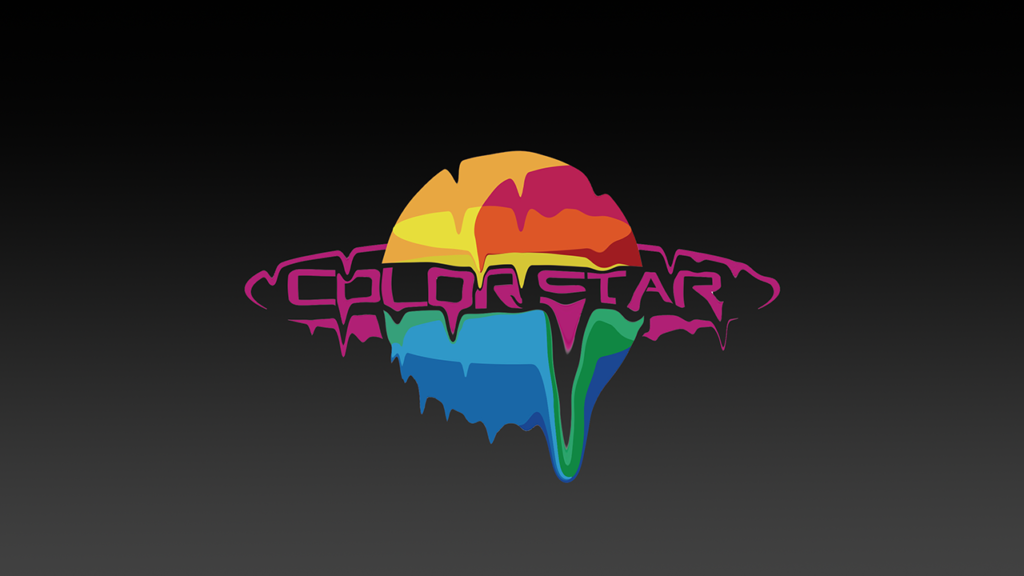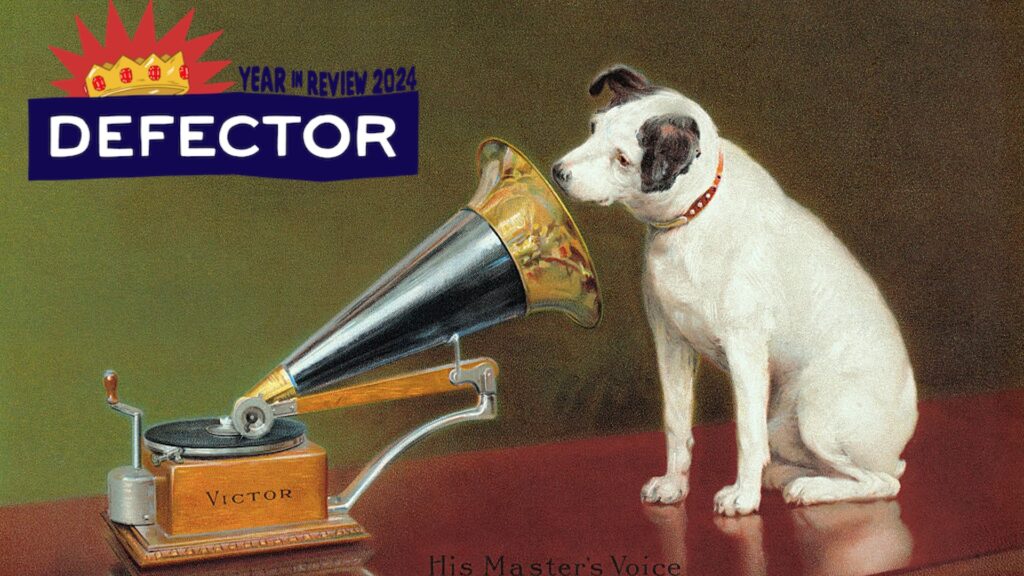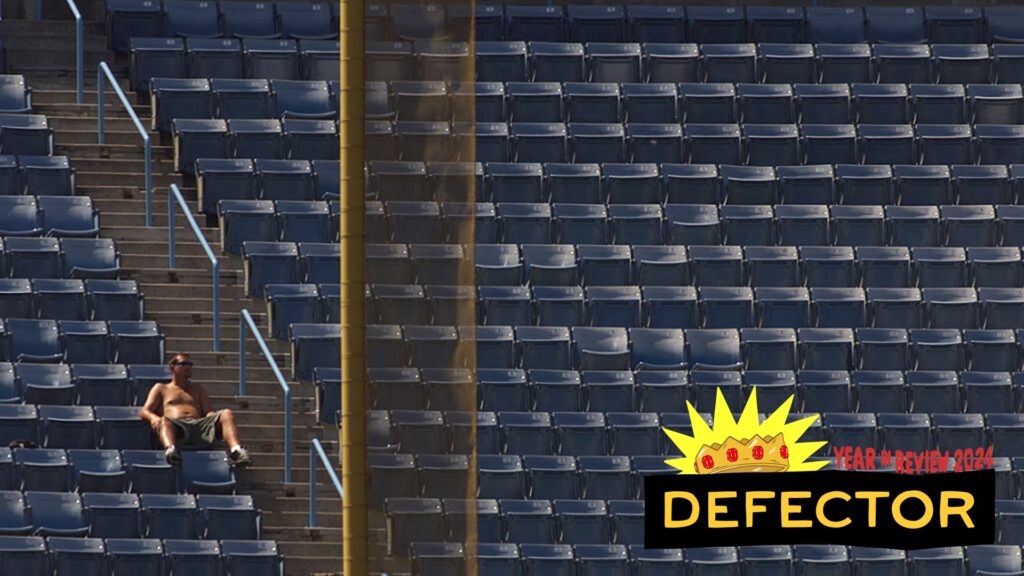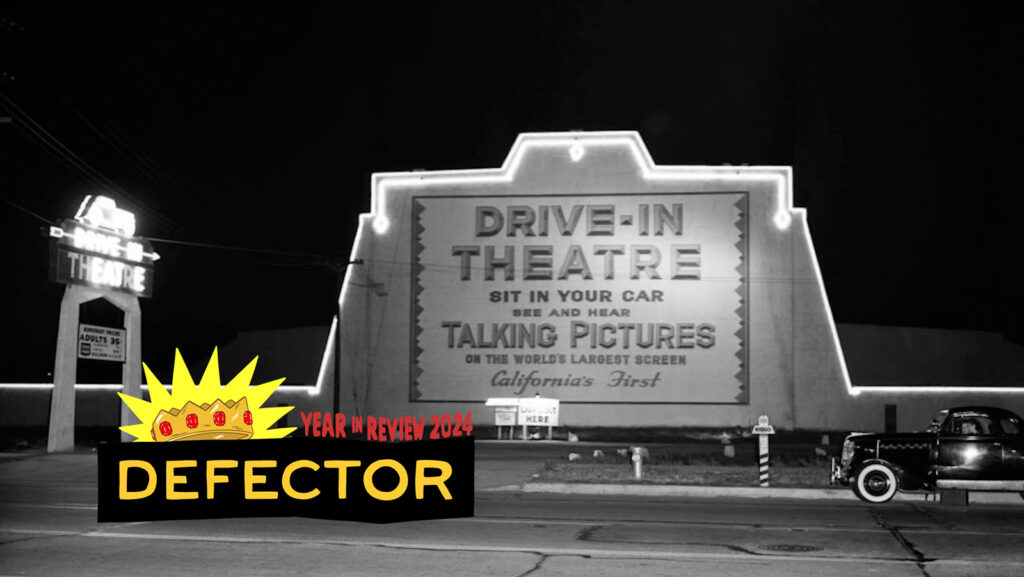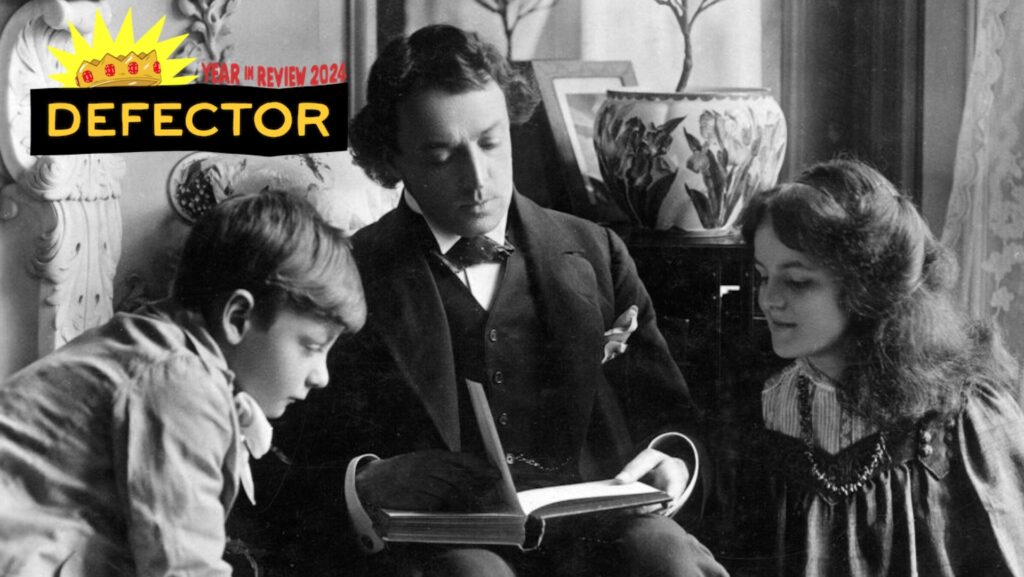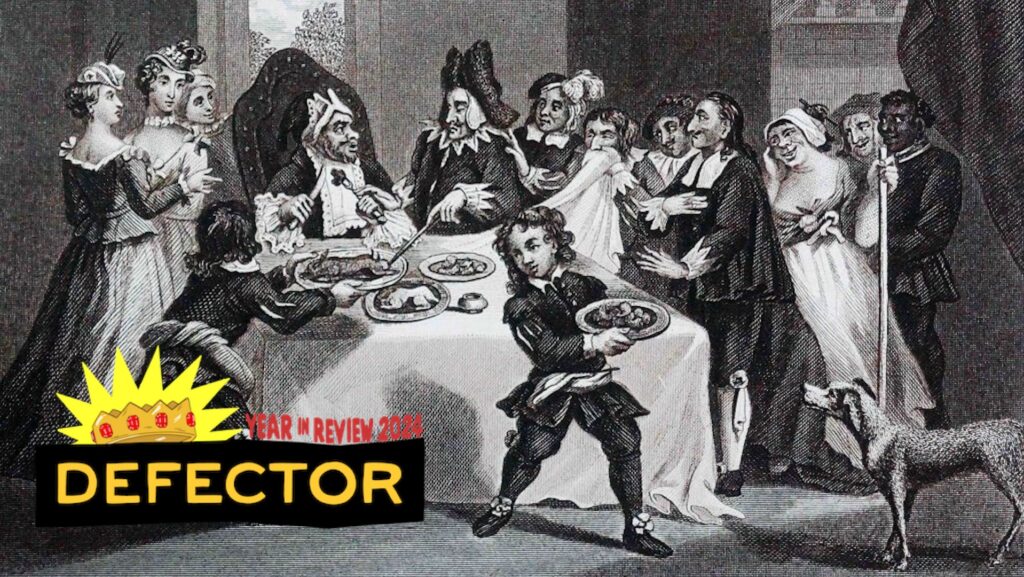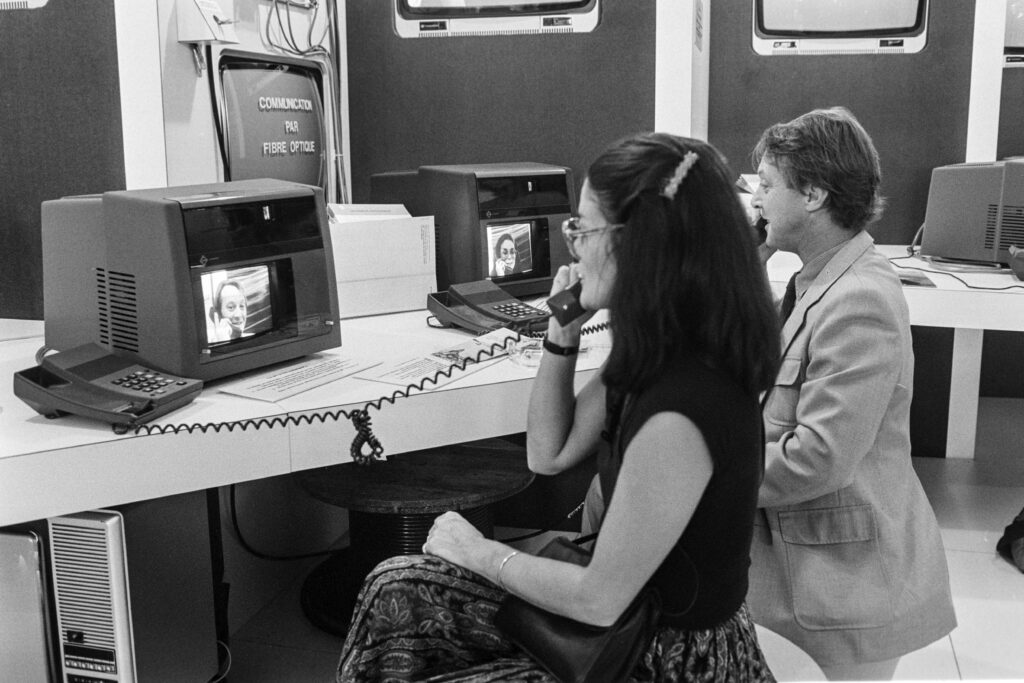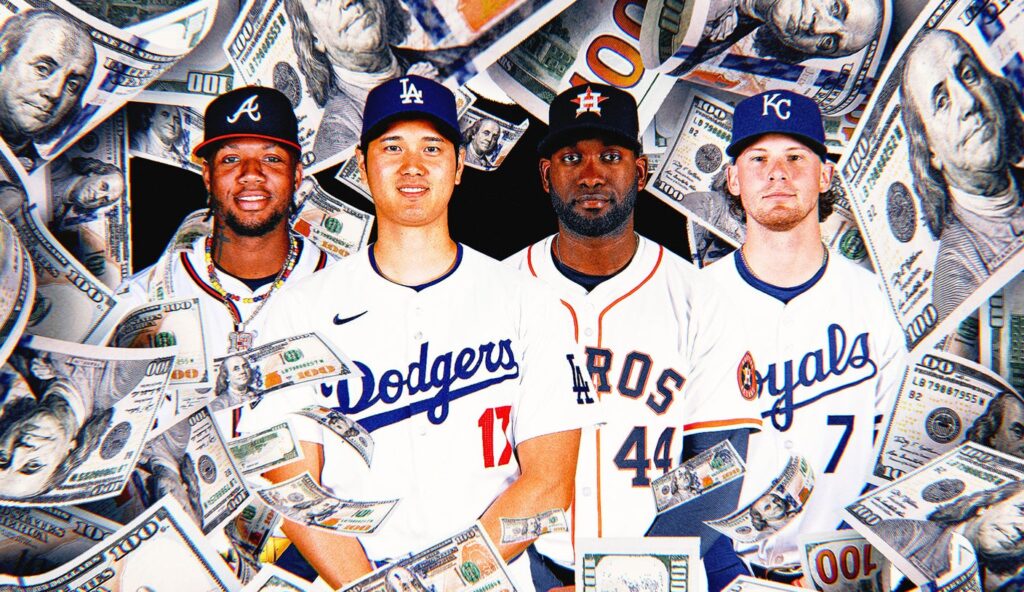It was a concerning year. WWE continued to enlarge and enrich itself even as it failed to honestly reckon with the legacy of Vince McMahon. AEW—once an avatar of hope and change—took a creative and cultural nosedive. The Japanese scene is economically hamstrung and can’t keep its top talents from moving to the States. It all combined for perhaps the worst non-COVID year for a wrestling fan since the widespread adoption of internet streaming. I look around and I crave a spark—an inspiring rivalry like Kobashi-Misawa, Punk-Joe, or Omega-Okada that lights a better path forward.
With that pessimism in mind, I picked 10 matches from 10 promotions this year, instead of the 15 I struggled to narrow down in 2022 and 2023. But I liked them, and I think you should check them out, because I got out of them what I still get out of great wrestling: excitement, astonishment, joy. Here they are, in chronological order:
AKINO vs. Mio Momono, OZ Academy The Wizard Of OZ, 1/7
The women’s wrestling landscape in Japan is so sprawling—even more so now that new promotion Marigold has split off from market leader Stardom—that I feel like I’m still regularly learning about niche companies that feature major talents at the top of the card. This match was my introduction to OZ Academy—founded by joshi legend Mayumi Ozaki, not Ariana Grande and Cynthia Erivo—and it’s an impeccable example of a timeless formula. Momono was the cute, diminutive challenger facing off against a swaggering punk-rock champion twice her age, and she fought from underneath the whole time, enduring relentless punishment while she survived by her craftiness and determination. In front of an engaged crowd, AKINO and Momono put a lot of intention behind all their movements and built to a very pleasing finale. This is just a match with really great energy.
Watch the show on the Internet Archive
Sareee vs. Chihiro Hashimoto, Sareee-ISM Chapter III, 1/16
This is the sequel to a match I singled out last year, and it’s an absolute killer. Sareee is one of my favorite wrestlers in the world right now, someone whose presentation manages the tricky feat of balancing underdog likability with undeniable virtuosity. (My random comp: early-career Steph Curry.) Her opponent here was the strong, reliable Chihiro Hashimoto, who’d beaten her upon her return to Japan in 2023, and both were game for some vicious action. The spots on the outside were nuts, but they also felt earned by the intensity these two seem bring out of each other. After they got back in the ring, it was a sprint to the finish—one that left me hoping there’d be a third singles confrontation for me to write about in 2025.

Darby Allin & Sting vs. The Young Bucks, AEW Revolution, 3/3
AEW kind of sucks right now, because across their five(!) hours of weekly TV they can’t stay disciplined with stories or believable character arcs. (My editor-speak diagnosis: There are lots of causes in AEW, and very few effects.) But the second-biggest promotion in the world was still buoyed in its fifth year by its celebrations of a couple of legends. In the summer, Bryan Danielson won their championship at the high point of a “final full-time year in wrestling” that allowed everyone to savor and admire all the unparalleled brilliance he still had left in him. But before that, back in March, we got Sting’s Final Match—a retirement party in Greensboro that saw the guest of honor hurled through multiple tables and a pane of sugar glass en route to one more moment on top.
Sting, now 65 years old, already had his legacy cemented as a main-event stalwart and an icon of the late-’90s boom when he joined AEW at the end of 2020. But in the matches that followed he defied all conventional wisdom about the toll that his career had taken on his body. Paired with a daredevil son in Darby Allin, he pulled out high-risk dives and stunts, refusing to coast on aura. Against the Young Bucks, expert workers well-trained in crowd-pleasing bombast, Sting transcended the nostalgia to give an electrifying live performance one final time.
At its best, AEW is a bunch of extraordinary wrestlers using the relative freedom the company provides to push each other’s limits, with everyone trying to discover the spark that will set them apart from other all-stars. That someone like Sting would come into this promotion and challenge himself to find new life—not just through mentorship, but in the ring—speaks volumes both about who he is as an entertainer and what this promotion can offer its fans. AEW has the potential to sell both that old-school wrestling buzz from when its audience was kids and the promise of top talents unconstrained by arbitrary rules or financial limits. As it stands right now, it feels way too haphazard, but the ingredients are all there.
Watch the match on TokyVideo.
Blue Panther vs. Hechicero, Martes De Arena Mexico, 6/11
Speaking of victory laps, Blue Panther had his “Kokomo” moment down in CMLL. The oldest promotion in the world was a bright spot on the map this year, drawing such enthusiastic crowds in Mexico City on Friday nights that rich American stars went out of their way to have the experience for themselves, slotting into all-action lucha cards as consistently entertaining as any other weekly show in the world.
Thanks to a working agreement with AEW, and the fact that Bryan Danielson had the clout to get all the matches he wanted on his not-a-retirement tour, the American Dragon got to wrestle a lucha hero of his, now 64 years old, in a dream match long anticipated by hardcore fans. Their meeting was a memorable one, as was the preceding red-hot four-on-four match they participated in. But watching Blue Panther this year, I got especially misty a couple months later when he took on the submission wizard Hechicero on a Tuesday show in Arena Mexico.
This match had way less hype than the Danielson showdown, but I think that made its greatness even more special, particularly when Blue Panther took to the skies with a flipping leap off the ring apron to the outside and a dive from the entrance ramp to the floor. He’s in his 60s! He was a star in the 1980s! And yet still, there’s no need for him to retire. He can still wow a crowd on a random weeknight by getting his body to pull off some old tricks, and that’s something only wrestling can provide. If Blue Panther were a “real” athlete, he’d have been long ago surpassed and phased out. If he were an actor, there’d be no real risk involved. By existing between those two worlds, Sting and Panther (and Danielson if he comes back) offer up an inspiring fight against the clock—a dramatization of aging in real time that just happens to be supremely fun to watch. And as long as it’s still fun, that career should keep on going.

Mizuki, Pom Harajuku & Raku vs. Arisu Endo, HIMAWARI & Miu Watanabe, TJPW Up! Up! TJPW Tanabata Festival With Niki-chan, 7/7
Tokyo Joshi Pro Wrestling isn’t exactly beating the “promotion targeted at single straight men” allegations with this one, but I still loved the concept and embraced the anarchy of its execution.
The match here was a spin on a “lumberjack match,” in which a bunch of non-competing wrestlers hang outside the ring and thwart a participant if they try to escape. Here, rather than physical violence, the incentive to stay in bounds was the threat of squirt guns and water balloons—perhaps a welcoming salve on a July day in Ueno Park, to be honest.
You might be able to guess where this is going. Everyone got outside the ring, and the action devolved into a bunch of women having a water fight that just barely looks like pro wrestling. Mizuki got hold of a hose. Miu Wantanabe, the powerhouse in pink, got hold of her and swung her around, then later slammed another woman into an inflatable pool. It’s a little messy, very silly, and extremely outside-the-box in a way that makes it an obvious choice for a list like this. We should let boys do this too, sometime!
Masashi Takeda vs. Yusaku Ito, Tokyo Death Match Carnival, 7/11
What TJPW did with water, this match from the promotion Freedoms did with BLOOD. Death matches are the norm in this company, but Takeda and Ito took this one at least five sickening steps beyond normal. There was the genre-standard “light tubes to the head” stuff, again and again, a terrifying fall from the top rope into a net of barbed wire, and—worst of all—a spot where Takeda put a pot on Ito’s head and then smashed the pot with a cinder block. And then Ito kicked out!
Obviously, you want to believe these spots are being done relatively safely, and, you know, they’re not like actually murdering each other out there. But there’s still this horrible, thrilling reaction I feel when I see all that blood—plus all the practical-effects goop on Takeda’s face from Ito’s mouth mist—saturating another human’s body. It makes me wince. It makes me grateful that this isn’t my line of work. But it’s also, every once in a while, kind of inspiring to see two guys so passionate that they’re willing to mutilate themselves for their art. If squirt-gun shootouts are just a little too cutesy for you, see how you’re feeling after giving this match a spin.
Daniel Makabe vs. Kevin Ku, Scenic City Invitational, 7/12
I consciously avoid ranking the matches this list, because the difference between 4.5 and 4.75 stars isn’t worth thinking about that hard. But this was probably the top post-match promo of the year.
Kevin Ku is one half of one of my favorite tag teams on the indies, Violence Is Forever, but this night was all about saluting Daniel Makabe. A fixture of the Pacific Northwest, Makabe has become sort of famous for not being famous, like a Daniel Johnston or something. Once the best-kept secret in wrestling, now more of an open secret as he embarked on his retirement run, his career is an example of the rewarding work a wrestler can create even when they stay out of the spotlight. He and Ku combined for one of Makabe’s trademark mat-based struggles, with the guy on his way out gushing blood by the halfway point, and it was brutal and ugly enough that it set up an incredible moment in Makabe’s speech to the crowd. Looking like he just got mauled by a bear, Makabe asked into the microphone, “Is my wife around watching this?” The fan filming the video didn’t pan their camera, so all the viewer hears is a chagrined “Yeah…..” There’s a whole story about the life of an indie vet in just that exchange.
For anyone who’s any good coming into wrestling right now, you have to try pretty hard to stay independent. Not only did AEW basically double the number of TV opportunities for U.S. wrestlers in the years since its launch, but WWE’s developmental net has only stretched wider and wider, expanding this year into a branding program called “WWE ID” that reportedly pays indie guys for a right of first refusal on a full-time offer. The vast majority of wrestling fans, as far as I’ve seen, cheer when a guy they like gets money from a big company. It makes sense to do that, in so far as fans generally want artists to be stable enough financially to sustain their output, and it’s become passé in the culture to yell at a guy for taking a huge sum of money just because you think his creativity will suffer. But there’s a special place in my heart for the really talented guys who don’t “make it” in the traditional sense—who can loom large in a 200-cap shed instead of getting lost as a replaceable mid-carder on basic cable.
I don’t exactly feel comfortable encouraging anyone to take on the exhausting and dangerous grind of the indies instead of a richer, easier existence, but it’s hard for me to congratulate anyone who signs, either. I don’t want U.S. wrestling to keep shrinking and homogenizing until it’s just two companies, and I think every wrestling fan anywhere in the country should be able to drive to a good show and watch some of their guys up close every month. That’s how you get innovation, diversity, and the most exciting ideas that eventually trickle up to a larger audience. I hope Makabe’s work helps at least a few up-and-comers understand that a big check doesn’t necessarily have anything to do with success.

Danshoku Dino vs. Sanshiro Takagi, DDT Wrestle Peter Pan, 7/21
Danshoku Dino, of the colorful, goofy, second-tier Japanese promotion DDT, is a gay-panic wrestler whose popularity I chalk up to cultural differences, but this match was a funny conceit executed above and beyond expectations. It’s a “Weapons Rumble,” which is similar to the staggered-entrance battle royal that is WWE’s Royal Rumble. Except this is a singles match, and it’s a weapon that makes an appearance at every interval, offering varying levels of usefulness.
A few of the weapons were reasonably weapon-shaped, if still whimsical. But the big story out of this match was the climactic weapon, which was one of my heroes, Kota Ibushi, returning to the promotion where he made his name to kick some ass. Even in his clearly diminished physical state, the Golden Star remains magical and indecipherable.
I also love when people do bits, and there was a tremendous one in the middle of the match. The most abstract weapon of all was “a retirement ceremony” for Takagi, also DDT’s founder. As he was spotlighted in the center of the ring, Saki Akai came out with flowers and a prepared speech. (Not prepared by her, though; she needed the referee’s help with some of the kanji.) Takagi and Akai posed for photos, Dino came into the frame for a 10-bell salute, and then finally we got the payoff, which was Takagi attacking Dino with the flowers. Was it worth all the elaborate set-up? Absolutely.
Watch the full show on the Internet Archive.
Mike Bailey vs. Titus Alexander, DPW World’s Strongest, 11/17
This is the one match that I didn’t go back and rewatch for this list, but the memory is still sharp. Going to a Deadlock Pro show in New Jersey was an easy sell for me, since the North Carolina–based indie is my official 2024 winner of Best Promotion (That Runs Monthly), and they overdelivered a tight set of hair-raising matches.
I could have easily picked the lucha match involving The Beast Mortos, Rey Horus, and Arez for this slot, because their ridiculous mid-air tricks made a crowd of full-grown men act like they’d just seen the Justice League in the flesh. But I wanted to shout out “Speedball” Mike Bailey in particular, since his reign as indie king appears to be ending with an AEW deal reportedly imminent. Ever since he was allowed back in the States in 2022 after a ban for working without a visa, the Quebecois he/they has wrestled like he’s been trying to take over the whole country, and then some. For three years now, there’s been no surer thing in wrestling than the guarantee that watching a Speedball match live would be entertaining. There was simply no matching his consistency on such a demanding schedule, and even if you can argue that going to AEW will be a good new challenge for him, there’s going to be a giant hole left behind. (And, if you read my bits above on Sting or Daniel Makabe, you know I’d be lying if I said I believed that the bigger company automatically holds better things.)
This was a two-out-of-three falls against the cocky young thing Titus Alexander, and even though that stipulation has a well-established formula, it was the knowledge of Bailey’s new job that helped make it so suspenseful for me as an in-person witness. When Alexander stole the first fall quickly and then battered away at his opponent for a long, long time in the second, it was possible, I theorized, that Bailey was in the mood to do the kid a huge solid on his way out and shock the crowd by losing two straight. That didn’t happen—he exploited Alexander’s mental weakness to eke out a delightful surprise of a victory—but I didn’t know it at the time! I was watching with innocent eyes, invested in all possible outcomes. While Bailey’s better known for his stamina than his storytelling, this was an emotionally fulfilling way to say “Maybe I’ll see ya later.”
Unicorn Party vs. Dr. Cube, Kaiju Big Battel 30th Anniversary Vol. 11 – The Grande Finale, 12/8
I thought about not including this one, because it’s a significantly different genre of pro wrestling than the rest. But it’s still wrestling. And I liked it!
Kaiju Big Battel is a long-running show that’s so over-the-top it almost qualifies as parody. All their performers have elaborate costumes, often inspired by Japanese monster movies, and for added effect, the ring will have little cardboard “buildings” on the mat that can be crushed. The presentation, to me, emphasizes the phoniness of the whole thing a little too much, stripping necessary stakes away from the fiction. But when the bell rings and those gorgeous get-ups crash into each other, it’s very hard not to get excited. Imagine looking away from what’s essentially a mascot brawl.
This Kaiju main event in Brooklyn pitted the evil Dr. Cube—he wears a big cube on his head to hide his disfigurement—against the heroic Unicorn Party, whose outfit is really the only one in the promotion that prioritizes freedom of movement over extravagance. They threw everything at the wall in this one, bringing out a whole posse of performers that included a surprise appearance from a bat-wielding Santa Claus. (Santa, I’m sorry to say, was worse than useless as a fighter.) The effect was like looking through a kaleidoscope—this psychedelic mishmash of humanoid creatures all bonking into each other just a few feet away. It’s disappointing that the filmed version of this match doesn’t really include the crowd noise, because the fans were in love with the action.
I have a system for evaluating the psychology of a live pro wrestling match. I call it the “Come on!” test. Basically, when there’s bad-guy skullduggery happening in front of me, I’ll sometimes go “Come on!” in a tone that sounds genuinely upset by the unfairness. It doesn’t mean that I think it’s real, but it does mean that the performers have earned my investment in the world they’ve created, and I can suspend my disbelief. With the atmosphere, the commitment of the performers, and the epic length, even with all the absurdity, this match passed the “Come on!” test! There’s nothing any live performance can do that’s more important than making a person care.

Having started this list on such a down note before highlighting the bright spots in the darkness, I feel compelled to wrap it up with something like, “maybe 2024 wasn’t so bad for wrestling after all.” But that’s not really true. The endless-growth mandate guiding both WWE and AEW, the homogenization of matches through the ease of streaming, the lingering influence of mediocre 2000s WWE on western wrestlers, and a frustrating disregard for the importance of emotional investment are all malicious influences that deserve to be stopped. I’m sure I still won’t have trouble finding 10 matches I like in 2025. But I hope I regain a little optimism by next year.

 Workout
Workout
 Meditation
Meditation




 Contact Us
Contact Us
